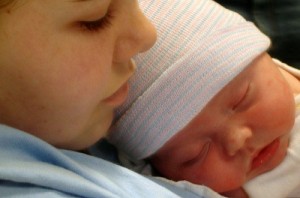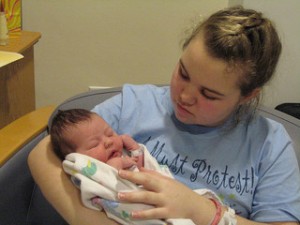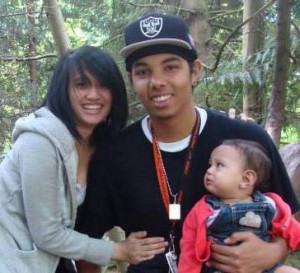Series: Welcoming All Families; Working With Teen Parents
By: Sharon Muza, BS, LCCE, FACCE, CD/BDT(DONA), CLE | 0 Comments
On Tuesday, I highlighted the news that teen birth rates have dropped significantly. Our occasional series on welcoming all families continues today by examining the issue of teaching childbirth education classes for teen parents. Teenagers and very young adults may be part of your student population, or you may have considered running a class just for this special group. Either way, today's blog post by Serena O'Dwyer, Director of Education for the Pregnancy Resource Center, in Everett, WA is chock full of information you can use to better serve teen parents. - Sharon Muza, Community Manager

© http://flic.kr/p/5L3wn7
Imagine being 16. Maybe that thought alone is painful? Now imagine you're pregnant and your mother is dragging you to a childbirth class on the same night as "Pretty Little Liars." Why are you going with your mother? There may be a really good chance that the baby's daddy doesn't want to be a part of your future, let alone go to class with you. You might be secretly hoping that none of the other dads come to class because that might make you feel better since your own boyfriend is MIA. Or maybe you don't mind going because your BFF is with you. Now you can sit in the back of the room together and giggle every time the instructor says "vagina." Your next thought is "Holy Crap, what is going to happen to my vagina?!..."
Childbirth educators, this may be your audience.
I've been teaching childbirth classes for nearly 6 years and am the Education Director for a childbirth education program designed for teens, single mothers and families experiencing unplanned pregnancies. In my regular childbirth class series, the class attendees' ages may range from 14-45. However, we recently started offering a teen series for the younger families who prefer to learn exclusively amongst their own peers. Though I had always gotten positive feedback from the young families who attended the original mixed demographic classes, I saw many teens censor themselves or reserve their questions for later, to be sent as an email, which they viewed as a "safer" method of communication.
I came to the class with the baby's dad. He was kind of hesitant to go at first. He did not want to feel judged for being young. He didn't feel judged though and he liked the information so we continued the course together. - Teen mother
Since separating these younger mothers from the older crowds, I have seen much more consistent attendance and class involvement. Asking questions and exploring options with other young women, who are also facing many of the same social and relational challenges, seems less intimidating for these young mothers. One of the biggest benefits of an exclusively-teen audience is the opportunity to foster new relationships with other young mothers and fathers. I'm always amazed at how quick they are to connect with one another and form strong bonds. This is very critical, considering that most of their friends are still living the lifestyle of a carefree teen rather than a young adult preparing for parenthood.
Before I entered the class, childbirth and breastfeeding felt unreal. I was so scared about getting a cesarean section and the pain of birth. I felt SO much better after finding out about doulas and giving birth naturally and breastfeeding. After the class I was still a little scared, but much more confident. Teen mother

© http://flic.kr/p/5JVBsD
Discussions amongst pregnant teens can be quite different than those held on the same subject conducted by their elder counterparts. One of the most powerful discussions I have facilitated concerned shame. During a postpartum recovery topic, I asked what their support systems looked like. The conversation went on to reveal a common struggle of most of the young mothers, regarding their friends and family accepting their pregnancies. Each young woman shared a very similar story about a family member or peer calling her a "whore" and telling the young women that they had no business having a baby. There were seven teen mothers in that classroom and all seven of them had been made to feel unclean and incapable of motherhood at one point or another. While this was extremely disheartening to hear, it was a beautiful discussion: honest and raw and undeniably unifying. Most of these mothers have wonderful support from friends and family, but they also have to deal with the brutal judgments of others.
I feel like now I know that I have rights and choices over myself and my baby. Teen mother
How many times have you heard the phrase "babies having babies"? How many times have these young mothers been told that? Statements such as this don't empower young families and they certainly don't build confidence or encourage a new mother's parental advocacy. As childbirth educators, we have the incredible honor of shattering that paradigmt! These are young women becoming young mothers and they need our encouragement and they need tools. It is our responsibility to set aside whatever biases we might have about teen pregnancy/parenting and strive to empower these mothers. This empowerment goes beyond just informing them that they have choices. They are often just learning that these choices are THEIRS to make. It's common for childbirth class attendance to be mandated by parents, counselors or social workers. Many of these women haven't even selected their own care provider but rather attend appointments made by their parents with a health care provider chosen without their input. Our challenge as educators is to turn a "required" class into a safe place where they CHOOSE to learn and engage.
Before the class I had NO idea about the choices I had in my birth. It really changed my birth plans. I ended up waiting longer to go into the hospital and labored in the birth tub. I went totally med-free! Teen Mom

Teens Dj, Dre and their young son
I understand that not every educator may be able to host a "Teen Only" class, but any talented and compassionate instructor can welcome, educate and help empower a young mother and partner within a group of established, older students by always being conscious and courteous of the societal gap. Here are some tangible suggestions:
- Alienation is one of the biggest hurdles in a mixed-generation class and we can't always avoid that as some mothers will choose to isolate themselves. Try and cater your icebreakers/get-to-know-you sessions to break through social and age barriers. Chances are they all watch those horrid baby shows on TLC, let them celebrate that common bond before you encourage them to turn it off. (Even though we know they won't.)
- Often the younger attendees are left to feel inadequate if they are not able to contribute their own experiences to discussions. Keep this in mind when topics such as work, money and relationships come up. Incorporate common teen scenarios into your problem solving sessions and role plays. For example: when discussing breastfeeding, don't just talk about moms going back to work, acknowledge that some mothers may be going back to school and let them know that they can pump at school in the nurse's office or other private location.
- Tweak your terminology. Talking about breasts and vaginas can be difficult for any age group but for a teen it can be painfully awkward. Try making it less awkward by diffusing the tension with adjusted terminology. Here's an idea for example: when defining the vagina and it's function in birth, you can encourage everyone in the room to share as many names for vagina as they can come up with. Grab a marker, write out their brainstormed terms and be prepared to learn a couple new nicknames! This lets everyone know that it's okay to laugh and it's okay to use the words we are more comfortable saying. Afterwards, it will be safe to say, "Your girly-bits are going to be a bit sore for a few days." once you've already defined the perineum.
- Play to the strengths of youth throughout your class/series by incorporating relevant interests like technology, celebrities, music, TV and movies. Pregnancy and birth apps are a hit. Talking about which stars are breastfeeding/baby-wearing seems to appeal to all age groups. Consider utilizing modern music for ambience. Maybe also mention how Adele might be great for relaxing throughout labor, but a little AC/DC can help energize for 2nd stage. What movies are out there portraying childbirth? "How realistic was that pushing scene from Knocked Up?"
- Provide safe, non-confrontational ways for students to ask questions. Write your cell phone number on the board and at certain points in class ask everyone to text you a question about the section you just taught. No one will be singled out and questions are anonymous. You may purchase a cheap, "pay as you go" phone just for this purpose if you want to keep your cell number private.
- Don't dumb-down your class content. Teenagers don't want to be treated like children so don't pander to them with trite games and exercises. If they feel secure in your class environment they will participate and ask questions if something is not clear. Teen students engage very well with informed decision-making as it sparks their curiosity and sense of justice.
- Teens will typically need to rely on more community resources than the rest of your parents. Seek out your local resources that cater to their age group:
- Teen parent support groups (Teen MOPS, Young Lives for example)
- Community resources for housing, education and parenting
- Legal resources and attorneys for parenting plans
- Mediators for parents and grandparents
- Free/sliding scale lactation consultants and doulas
Above all, be sincere. If someone feels patronized they will disengage. These teens are not "babies having babies", they are young women becoming mothers, just like everyone else in the room. Let us highlight their capabilities, help build confidence and empower self-advocacy for themselves and their children.
Have you taught teen parents? In specialized classes or as part of your regular offerings? What has been your experiences with working with very young mothers and fathers? How do you engage and welcome these unique families? Please share your favorite resources, tips and activities so that we all may become better educators and work more effectively with teen families. - Sharon Muza
About Serena O'Dwyer
 Serena O'Dwyer is the Director of Education for Pregnancy Resource Center in Everett, Washington. As a volunteer instructor, she has taught free childbirth classes to hundreds of families in her community. She is currently teaching the class series, Expecting Your Miracle for Teens and is passionate about empowering young families. Serena received her first childbirth educator training through ICEA in 2007 and then from Lamaze International/Passion for Birth, in 2011. She is currently working on certification through Lamaze. Serena is also a birth doula at Serene Doulas. She can be reached at serena@expectingmiracles.com
Serena O'Dwyer is the Director of Education for Pregnancy Resource Center in Everett, Washington. As a volunteer instructor, she has taught free childbirth classes to hundreds of families in her community. She is currently teaching the class series, Expecting Your Miracle for Teens and is passionate about empowering young families. Serena received her first childbirth educator training through ICEA in 2007 and then from Lamaze International/Passion for Birth, in 2011. She is currently working on certification through Lamaze. Serena is also a birth doula at Serene Doulas. She can be reached at serena@expectingmiracles.com
Published: June 19, 2013
Tags
PregnancyChildbirth educationCDCLabor/BirthMaternal Infant CareTeen PregnancyU.S. Teen Pregnancy RateSeries: Welcoming All FamiliesWelcoming All FamiliesTeen Birth RateSerena O'DwyerTeen Childbirth Classes